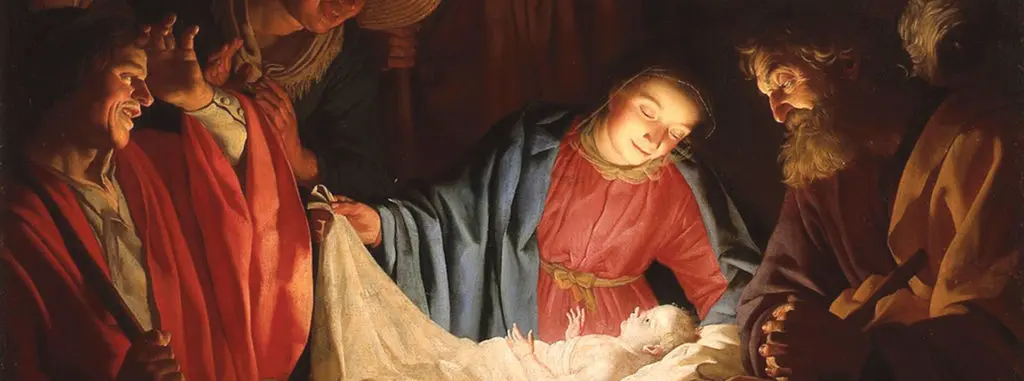Human Dignity in Christ’s Nativity

“How precious must man be in the eyes of the Creator, if he gained so great a Redeemer, and if God ‘gave his only Son’ in order that man ‘should not perish but have eternal life.’” ― Pope St. John Paul II, Redemptor hominis, no. 10
Christmas is about celebrating the most precious gift of Life—the birth of our Lord and Savior Jesus Christ. St. John’s Gospel expresses the reason for our celebration and why billions of people honor His birth: “For God so loved the world that He gave us His only Son, so that everyone who believes in Him may not be lost but may have eternal life” (Jn 3:16). Jesus Christ is the definitive proof that God cares, giving His only begotten Son for our salvation, pouring forth unsparingly His kindness, mercy, and love.
Jesus’ birth is a pressing call to respond to God’s great love for us. “If it is true that God has created us, that He has redeemed us, that He loves us so much that He has given up His only begotten Son for us,” says St. Josemaria Escriva, then “how can we doubt that He wants us to respond to Him with all our love?” (Friends of God, 251) The story of Jesus must be seen in this light. This is the heart of God, who longs for our friendship.

For a moment, at Christmas, the world stops and offers some recognition of Jesus’ birth—religious services, festivities, lights, and tinsel—but often is deaf to the core message of the One who “came so that they might have life and have it more abundantly” (Jn 10:10), who “loved me and gave Himself up for me“ (Gal 2:20). Only when the true meaning of Christmas—why God became man—is internalized can we fully understand its transformative power upon us and our relationship to others.
The Love of Christmas in The World
“As I have loved you,” says Jesus, “so you also should love one another” (Jn 13:34). Modeling God’s love revealed in Christ leads us to love others. “This is how all will know that you are my disciples, if you have love for one another” (Jn 13:35). And this self-giving love has the power to renew every human heart and overcome evil, to renew the face of the earth. When rooted and established in love, we have the power of Christ.
The Christmas story challenges us to reject a disinterested, self-absorbed existence and realize true love, a love that is freely given and has the power to overcome evil. And the root of this love is God’s love, and its fruit is God’s love lived out fully in our daily lives.
All too often modern society turns its back on the weakest and most vulnerable. And desensitized to the incomparable and immutable value of the human person, life is devalued, treated as a thing, and destroyed for the sake of convenience. In the midst of such blatant disregard and spiritual blindness, Christ’s birth reminds us that life is sacred, a gift to be cherished, protected, and celebrated. Christmas calls us to honor and defend the miracle of life.

“Christmas,” Pope St. John Paul II says, “reveals the full meaning of every human birth, and the joy which accompanies the Birth of the Messiah is thus seen to be the foundation and fulfilment of joy at every child born into the world” (Evangelium vitae, no. 1).
Human Dignity in The Incarnation
Because of the Incarnation, this message of the innate dignity shared by every human being is elevated even further by a new awareness of just how great God’s personal love for every human being is, and how lofty is the human destiny.
By uniting Himself to us in His human nature, God reveals that there is something wondrous about the human person. The emptying of Himself, so as to take on the nature of His creature, confirms in an astonishing fashion just how great human dignity is. In other words, Jesus’ story, beginning with His incarnation and birth, resoundingly affirms the immeasurable dignity and worth of the human person. “For your sake [God] became poor although He was rich,” says St. Paul, “so that by His poverty you might become rich” (2 Cor 8:9).
Of all creatures in the material world, the human person alone bears within himself the “image” of God, a likeness that renders him capable of seeing God face to face. Christ uniting Himself with human nature also shows that every human person is called to be united with God, for the human person is “the only creature on earth that God has willed for its own sake. From his conception, he is destined for eternal beatitude” (Catechism of the Catholic Church, no 1703)
“Man,” wrote Pope St. John Paul II,
is called to a fullness of life which far exceeds the dimensions of his earthly existence, because it consists in sharing the very life of God. The loftiness of this supernatural vocation reveals the greatness and the inestimable value of human life even in its temporal phase. Life in time, in fact, is the fundamental condition, the initial stage and an integral part of the entire unified process of human existence. (Evangelium vitae, no. 2)

Since every person beams with the transcendent, our responses and actions regarding human dignity must affirm and reflect this profound reality.
An Encounter with Love
In Fratelli tutti, Pope Francis reminds us that “the greatest danger lies in failing to love”(no. 92).
Jesus’ story defines and gives shape to the life of Christians. “We love because He first loved us” (1 Jn 4:19). In response to this free gift, the Holy Father challenges us to feel another’s pain, to recognize a neighbor’s need, to be sensitive to the injustices perpetrated against human dignity, and to act for justice.
The Infancy Narrative (Lk 1:5–2:52) is a story that could not be more evocative and more affirming of our great mission to defend the most defenseless. It is a timeless reminder that every human life, no matter how small or vulnerable, holds immeasurable worth and divine purpose. It offers a poignant glimpse into the sanctity of life within the womb.
In the Visitation, Mary, carrying the Christ Child, “goes in haste” to assist her cousin Elizabeth, who “has also conceived a son in her old age.” This act of love shows both solidarity and concern that we too ought to have for human persons. Mary also goes to Elizabeth because the Son of God desired to sanctify John the Baptist within his mother’s womb. How remarkable that the first person, other than Mary and Joseph, to recognize the great gift Who was coming into the world is a preborn child! This encounter becomes not only an occasion of joy but also a powerful affirmation of the humanity and dignity inherent in everylife, born and preborn.
As Pope St. John Paul II says, “Christ reveals man to himself.” Christ was God, but also man. And as the perfect, sinless man, He has revealed the heights of dignity for which every human being was intended, and to which he is called.
Rejection of Christmas in Society
Sadly, however, there is a prevalent mindset in modern society and culture that ignores or rejects the message of Christmas, a message that is rooted in the generosity of God who comes to save His people. It fails to see the gift of salvation, the dignity restored to man by Christ and fails to recognize the deepest level of being we derive from God and from our relationship with others. Instead, it celebrates autonomy, self-determination, and radical individualism, a universe in which God is no longer found or desired.
Against this backdrop, one can see how human life can be easily devalued, lose its meaningfulness and purpose and be easily manipulated by the interests of others and ideologies. “Radical individualism is a virus,” says Pope Francis, “that is extremely difficult to eliminate, for it is clever.” This mindset “makes us believe that everything consists in giving free rein to our own ambitions.” But the Holy Father exposes the lie and rejects this falsification of freedom, saying that:
Individualism does not make us more free, more equal, more fraternal. The mere sum of individual interests is not capable of generating a better world for the whole human family. Nor can it save us from the many ills that are now increasingly globalized. (Fratelli tutti, no. 105).
In The Christ Child We Are Healed
The remedy for this dilemma is revealed in the Christmas story, a story about love, mercy, compassion, and the promotion of human dignity. Christ, by taking on human flesh and a human nature, has permanently elevated human existence. He takes on human flesh in order to communicate with us. And by becoming part of the human family, Jesus, the Word made Flesh, units Himself with every person and establishes a new kind of relationship with God and all humanity. Incorporated into this new relationship also means we share in His own life, a life of self-giving love.
“Isolation and withdrawal into one’s own interests,” says Pope Francis, “are never the way to restore hope and bring about renewal.” The remedy is “closeness; it is the culture of encounter” (Fratelli tutti, no. 30).

This is the marvelous truth contained in the Christmas story. Let us pray for the grace, this Christmas, to see it. To really see it. And then let us put our hands to the plow and respond to Christ’s call to preach this Good News to the four corners of the globe. Let this and the defense of human dignity be the fulcrum upon which a new and intentional “culture of encounter” be built.


Merry Christmas Fr. Boquet and to all the menbers of Human Life International!!!
A most eloquent and profund article
on the inherent dignity and inviolable right of every human being.
‘We are made in His image’, has the ability to transform ourselves and the world around us, if we only but hold fast to its simple yet profound message
God bless you in your inspiring work, tgat empowers us to dutifully & knowedgably spread Gods great work, & to inspire others.
Love of God requires Respect for the life of all his creatures. Humanity cannot survive without it
Thanks be to God!
That was a perfect way yo.express the wonder of Christmas and value. of human life. God became man.